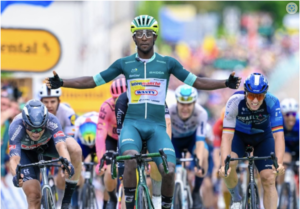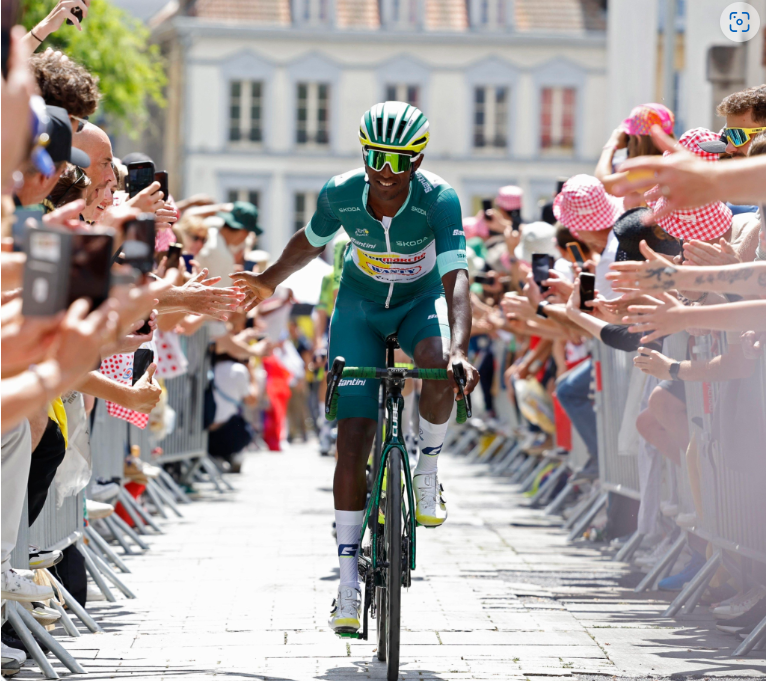
A young Eritrean refugee, TikToker, made a video this week; he was smiling and super cheerful. He appears to be in his early 20s, if not a teenager. He says to his followers:
‘If you ask me, where am I from, brother?” and answers himself, comically in English.
“I am from Biniam Giramy; I am from Biniam Girmay brother …. You make me proud brother, you make me proud brother …” repeated again and again, joyfully.

Eritreans, as well as global fans of cycling and sports in general, are celebrating the victories of the first Black Africa rider to win stages in the Tour de France, the world’s number one competitive cycling event. This cheerful young Eritrea’s TikTok video is one of many social media contents that caught my attention. I will say more about why it made me think.
Biniam Girmay won two stages in the Tour de France 2024; he might win more. But his victory has become a viral story; many are chanting his name. We saw videos from Asmara, his hometown, and mine as well; people are getting crazy, as he said. Yes, Bini is from a cycling-mad country, but he is also from a notoriously repressive regime.
In moments when sportsmen and women claim a world victory, we have seen how their hard-earned victories become a cause of joy and celebration, bringing everyone together to cheer their success. I witnessed that in South Africa when the Springboks, the South African national rugby team, won the 2023 world rugby championship. The streets where the team was passing were full of people of different ages, races, and nationalities, including non-South Africans. We all celebrated them together. Thus, winning trophies on world stages is a source of national pride and brings a sense of belonging among nationals and inspiration among youth. That is why governments invest in sports because of their importance in building a nation and future generations. Bini’s victory in the Tour de France would normally have the same effect among Eritreans, but I doubt it. However, despite our lack of pride in the conditions of our people, Bini’s victory in the Tour de France has brought us closer to home in various ways. His success also became an inspiration and a source of pride for Africans, wherever they are. Many have written and sung about his dreams, determination, and success, and they will continue as he continues making history. Consequently, Eritrea is also becoming a headline in the international news media.
The literature on refugees and migration studies frequently mentions Eritrea as one of the most diasporic countries, with a third of its population living abroad. As a result of our widespread dispersion in every corner of the world, many Eritrean funs accompany Bini and other Eritrean riders wherever they go. Cycling commentators, observing the unique ways in which Eritrean funs cheer and support their riders, have labeled Eritrea as a “cycling mad country.” However, they rarely mention the notoriously oppressive nature of the government. Maybe they are deliberately avoiding it so as not to spoil the sport. However, it is essential to know what circumstances Biniam and Eritrean youths are going through, either as riders or funs.
The Tour de France stage victory of Bini to Eritrean is like a rain that came after long years and flooded a desert. Eritreans have had very few moments to celebrate and be cheerful together as a nation in their history. Eritrea has been under repressive dictatorship for the past 30 years, and it ranks at the bottom for its human rights violations. The Eritrean community in the diaspora is largely divided into pro- and anti-Eritrean dictator. Bini’s Tour de France victory has brought Eritreans inside and outside euphoric emotions, wetting their dried sense of joy and happiness. However, if we ask how Bini’s victory contributed to a sense of pride and belonging to Eritreans as a collective nation, it has to be analyzed with a different lens.
By the way, Eritrea has been a headline in the international media in the past two years, remember. The advent of Brigade n’Hamedu (BNH), a youth-led anti-Eritrean government movement in the diaspora, has been a headline in the global media [1]. Since 2022, BNH has organized protests in major cities such as London, Stockholm, Frankfurt, Amsterdam, The Hague, Tel Aviv, Washington, DC, Atlanta, Calgary, and Toronto. Some of the protests have ended with violent clashes with the police and supporters of the Eritrean regime. The protests of BNH were reported by the BBC, CNN, Al Jazeera, AP News, France24, the Guardian, and the Times, among others. The media generally identified Eritreans as a nation of two flags: the red flag waved by the supporters of the dictatorial regime and the blue flag waved by pro-democracy Eritreans. Although spectators and politicians have expressed skepticism for its violent elements, the BNH protests have prompted substantial debates on transnational repression in many European nations, resulting in the passing of a strict bill against transnational repression, as seen by the Norwegian parliament [2].
Despite these two opposed groups in relation to the condition at home, they are both celebrating Biniam’s victory; they cheered him; the sense of belonging and feelings of closeness to home have obviously risen. Many Eritreans have been sharing their memories of cycling in Eritrea and reminiscing about their homeland. But deeper inside, the feeling of belonging and pride in a nation is different for the two groups. For the blue group, belongingness to the nation is driven by hope and inspiration for the birth of a democratic country where the rule of law, justice, and human rights would be respected. On the other hand, the red flag group refuses to acknowledge Eritrea’s current state of repression. They see Bini’s and other riders’ victories as a victory for the Eritrean repressive regime. In reality, the regime has repressed cycling and other sports in Eritrea. It shattered the dreams of generations of sportsmen and women and forced them to undergo military conscription like everyone else. For example, the Eritrean football (score) national team is known for disappearances. Several times, members of the national team or the whole team did not return to Eritrea when they had the opportunity to play outside. They prefer to live in search of their freedom outside the country rather than be conscripted. Currently, Eritrea does not have a national football team. Moreover, it is near impossible to leave Eritrea legally; the regime restricts almost everyone from leaving the country through ports. That is why we have not seen Bini celebrating his victories with his family, while other professional riders have their families supporting and cheering them on at the podium.
Many who are well-versed in Eritrea’s cycling culture would agree with me that Eritrea’s success on the Tour de France is long overdue. Eritrean riders had the potential to participate in world grand tours not less than 20 years ago, when Dr.Tewelde Tesfamariam (wedi Vaccaro), may his soul rest in heaven, was heavily investing in Eritrean cycling. Even before Eritrea gained independence, riders competed at the Olympic Games. Eritrea is behind in cycling and other sports because the repressive regime has put the country’s social, economic, and political conditions in an authoritarian, militaristic state. The regime denied two generations the chance to showcase their skills in the realm of sports and to experience moments of joy and happiness. With those opportunities, the younger generation also lost hope, inspiration, and role models to identify with. An Eritrean migrant in Israel or somewhere else who built a house and sponsored siblings to leave Eritrea has been a role model for many years. As such, many, including unaccompanied minors, have been fleeing the country. In diaspora, they had no one to associate with or identify themselves with as Eritreans.
Thus, why do I quote the TikToker who said, ‘I am from Biniam Girmay’. I am not sure how much he thought about this, but his lines speak to the identity crises of Eritrean refugees and others who fled their country of origin at a younger age. Studies show there is a limited representation of role models among young refugees. Negative narratives or stereotypes often overshadow refugee stories in the media and society. Positive role models that young refugees can identify with are not always visible, which affects young refugees’ ability to connect with them [3]. This is worse among Eritrean refugees, where generations passed without inspiration and triumphs. That is why the TikToker proudly said he is from Biniam Girmay. Not from Eritrea. For him, Biniam represents aspiration, hope, determination, pride, one of the best cyclists, and Bini is from his home country. Undoubtedly, he can identify with Biniam. The young man is obviously tired of associating with the negativity of refugees and migrants. However, for young refugees from Eritrea, the situation is even more dire. What good, inspiring, or uplifting is there to say about Eritrea? The nation has failed millions; the regime has failed generations and killed dreams. Let me tell you how his video resonates with my experience.
When acquaintances ask me where Eritrea is, I tease them by saying, ‘My friend, you either don’t study migration or you are not a fan of cycling’. Eritrea is known for forced migration; now we have added cycling. More than 80% of the people I meet, including my friends from my academic circle, don’t know about Eritrea. However, they are familiar with our neighboring country, Ethiopia, and recognize me as a fellow Ethiopian. It’s been a while since I stopped being bothered by why people don’t know about Eritrea, and I try less to educate them unless they ask. As an activist, I have consistently shared my experiences and the conditions in Eritrea. But after sharing the gross human rights violations in Eritrea, many people questioned whether I was speaking the truth or exaggerating. It is the story of dehumanization. Not positive experiences, inspiring, or uplifting to share, I can only tell the truth. At times, such stories become spoiling and daunting to share, even to listen to.
But now, thanks to Bini’s determination, his family’s support, and his team Intermarche-Wanty, which played a huge role in making his dream come true, Eritreans, particularly the youth, have a role model to identify with; we can say we are cycling champions. Like today, my colleague asked me if I went to the Durban July horse race. I proudly told him I am a fan of cycling, and an Eritrean rider is making history. Our moment is here and coming; we can at least say we are Biniam Girmay. We have waited too long for this; we should celebrate, but we cannot be silent, nor can we forget the lost opportunities and the dreams killed because of the repressive regime in Eritrea. For many Biniams to rise, the regime has to change.
- [1] Democracies as spaces to repress and defend human rights: the case of the Eritrean Blue Revolution Movement – Martin Plaut
- [2] Eritreans in Norway celebrate Parliament calling on the Norwegian government to tackle transnational repression – Martin Plaut
- [3] Mentoring for First-Generation Immigrant and Refugee Youth: National Mentoring Resource Center
Aron Hagos Tesfai is a post-doctoral researcher at HEARD | Working to advance health equity in Africa, University KwaZulu-Natal, South Africa. His research focus is Migration and psychosocial wellbeing of refugees. He is diaspora political and human rights activist. Contact him here: aribanov@gmail.com, Twitter (X) – AronT @aribanob